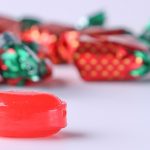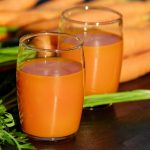Weird as it may sound, some very healthy foods can make us feel terrible, as if we’d eaten junk food. Many times, this can be chalked up to difficult-to-digest components. These digest in the intestines, not in the stomach, which causes bloating and gas. Other times, these foods carry unwanted ingredients with their own side effects.
 Whole grains
Whole grains
Though you eat whole grains for the benefit of fiber, all that fiber has a downside. Eaten too quickly or in large amounts, the fiber in whole grains sits in the intestines, and can cause gas and bloating. Ease your too-full feeling by eating your grains slowly, and drinking water during your meal to speed up digestion.
Almond milk
A great alternative for those who are lactose intolerant or merely want to be dairy-free, almond milk nevertheless has some unpleasant side effects. Certain brands use a thickening agent called carrageenan, which may cause digestive problems. Rather than suffer from the very alternative that’s supposed to make you feel better, check the ingredients on your almond milk. Chances are, you’ll find a brand that doesn’t use carrageenan.
 Cruciferous vegetables
Cruciferous vegetables
Dark and fibrous greens like broccoli, bok choy, and Brussels sprouts, while full of vitamin C, folate, and cancer-battling compounds, also contain a complex sugar called raffinose. This sugar is indigestible, and often produces bloating and gas. However, this is easy to fix. Simply steam these vegetables before eating. This breaks down the raffinose and preserves the veggies’ cancer-fighting nutrients.
Beans
You’ve probably heard the little ditty about the smelly effects of eating beans. The cause? Starches that end up digesting in the large intestine. But you don’t have to cut beans out of your diet to avoid gas. Rinse canned beans before eating or cooking, and soak dry beans overnight in water and baking soda. These methods will help reduce the starches. You can also gradually increase beans in your diet along with rinsing and soaking.
 Sugar-free candy
Sugar-free candy
As good as sugar-free sweets may sound, they can make you feel like quitting candy altogether. Their alternative sugar alcohols–like sorbitol, manitol, or anything ending in “ol”–are indigestible, and cause bacteria to ferment in the intestine. This in turn causes gas and bloating.
Dried fruit
When candy doesn’t work for you anymore, it may seem like a good idea to switch to dried fruit. The only thing to be careful of is your portion size. Drying fruit concentrates all that sugar into a smaller portion, which combined with denser fiber can lead to bloating. Just be careful to stick to a 1/4 cup serving.
 Pressed juice
Pressed juice
Despite the benefits of pressed juice, the downside is that it leaves behind all the fiber from pulp and skin. Normally, the fiber found in your favorite juicing produce keeps your body from digesting all that sugar too fast, resulting in a sugar high. Try to pick vegetables and fruits in your juice that are light on the sugar, or offset it with celery and kale. Or, go for a smoothie to keep the fiber in your drink.
Apples
The combo of high fiber and fructose found in apples causes a lot of bloating, despite all this fruit’s major benefits. However, you can avoid bloat by eating apples on their own, rather than with a meal that will only increase fiber and sugar.

 Whole grains
Whole grains Cruciferous vegetables
Cruciferous vegetables Sugar-free candy
Sugar-free candy Pressed juice
Pressed juice